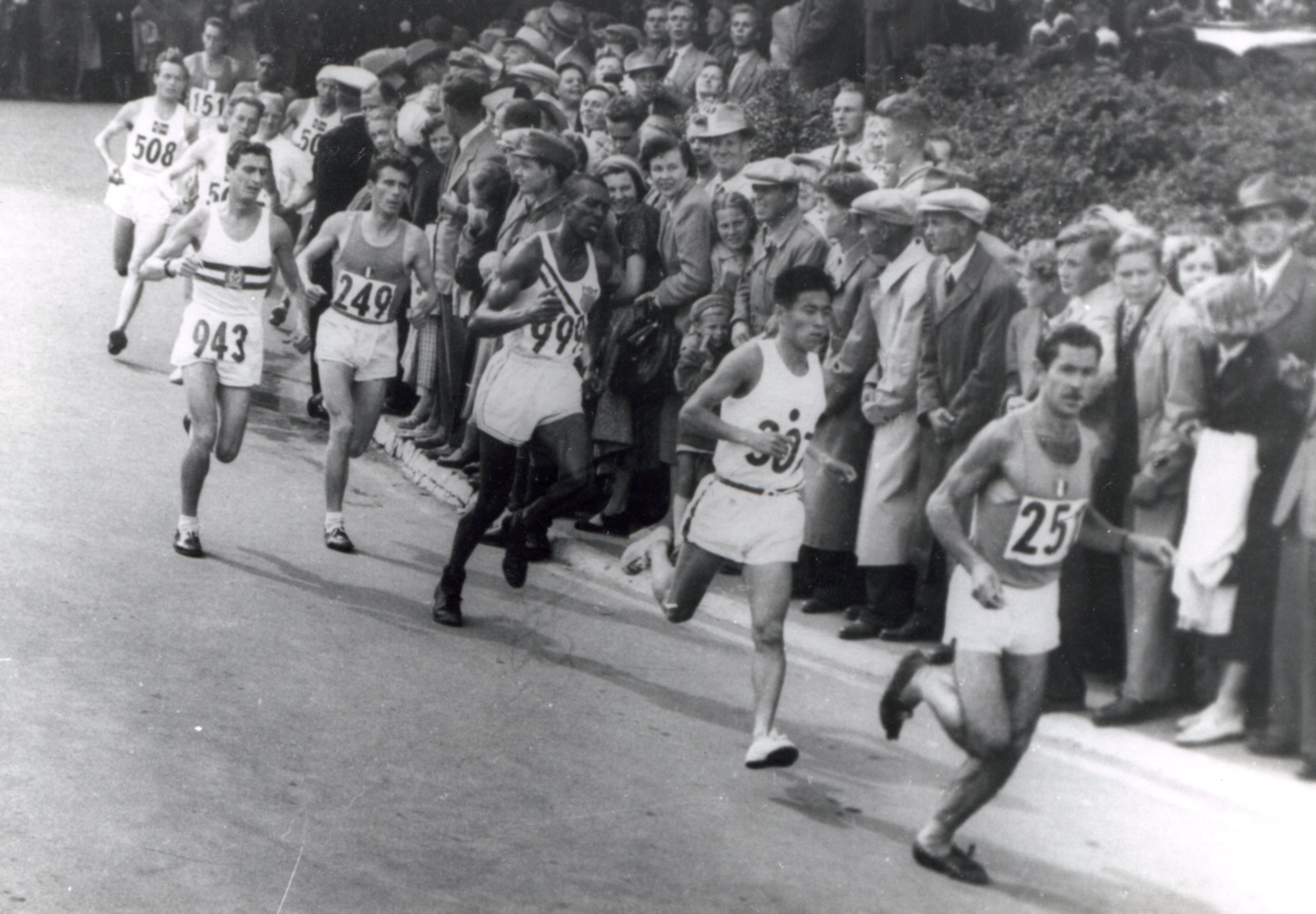Ted Corbitt, Forever an Olympian

On July 27, 1952, Ted Corbitt became the first African American runner to represent the United States in the Olympic Marathon when he ran 2:51:09 to finish 44th in Helsinki. Known as “the father of long-distance running,” Corbitt, the founding president of NYRR, broke barriers as an athlete, running 223 lifetime marathons and ultramarathons. He advocated tirelessly for diversity, equity, and inclusion in running, and his work to modernize and professionalize road racing changed the sport for all time.
Corbitt cherished his status as an Olympian. “Most records eventually are broken, but you’re a forever an Olympian,” said Corbitt’s son, Gary Corbitt. “He was proud of this signature accomplishment.” (Ted Corbitt died in 2007, at age 88.)
Gary and his mother attended a Broadway parade to cheer on the 1952 Olympic team. Though he was too young to remember that day, Gary recalls cheering for his father at the 1956 Yonkers Marathon, a 1956 Olympic selection race, four years later. Ted narrowly missed out on making his second Olympic team, but he shared a happy post-race moment with his family. He also, at age 41, contended for the 1960 Olympic team.

A Running Pioneer
Ted Corbitt was less interested in establishing “firsts” than in carrying on the tradition of greatness in African American distance running. “My father always told me there were other great Black runners before him,” said Gary. Ted was a member of the New York Pioneer Club, one of the first integrated American running organizations. His NYPC teammate Lou White placing third behind John A. Kelley and Gerald Cote at the 1946 U.S. marathon championship.
Gary Corbitt maintains a website, tedcorbitt.com, that includes an African American long-distance running history timeline. “One of my reasons for creating the timeline was to show there were great Black distance runners before my father including a world record holder, multi-day racers, national champions, and an Olympian, Earl Johnson in 1920 and 1924, long before my father,” he said.
Olympic Experience
The 1952 Olympic marathon was held on the warmest day of the Helsinki Games. Wearing number 999, Corbitt started on the front line with eventual gold medalist Emil Zatopek of Czechoslovakia and Britain’s Jim Peters, who was heavily favored but would drop out. Corbitt’s race was disappointing by his standards. “He was hampered by a side stitch the entire way,” said Gary. “His time was 8 to 10 minutes off of what he was capable of. He was still a novice at the marathon as this was only his seventh.”
Still, Corbitt made the most of his Olympic experience. One of the highlights was meeting Percy Cerutty, the renowned and innovative Australian coach. For Corbitt, who was also a physical therapist, learning about physical fitness was a lifelong quest. “They corresponded for years,” said Gary. “Both were early advocates of weight training in the 1950s, long before this became the norm. Cerutty was the first guest speaker to participate in a clinic conducted by the newly formed New York Road Runners in 1958, at Van Cortlandt Park.”
As he works to educate on the history of Black American distance running, Gary Corbitt has bold goals. “My hope is to both tell my father’s story but also to make known the great history of Black runners dating back to 1880,” he said. “African American long-distance running history has been hidden for too long. Once these stories are better disseminated, it is my hope that they’ll serve as inspirational role models for future generations.”
Present and Future
This year, the U.S Olympic Marathon Trials in February in Atlanta selected the team that will compete in Tokyo in 2021. Three of the six U.S. Olympic marathon team members are Black: Aliphine Tuliamuk, who won the women’s Trials race, Sally Kipyego, who was third behind her, and Abdi Abdirahman, third in the men’s race. They follow in the footsteps of Meb Keflezighi, who retired in 2017, having won a silver medal at the 2004 Olympic marathon (and finished fourth in 2012 in London and 33rd in Rio in 2016), and won the 2009 New York City Marathon and the 2014 Boston Marathon.
Gary Corbitt is passionate about increasing the representation of Black Americans in distance running, in the elite ranks and at all levels. For starters, the U.S. needs to identify and target Black college running talent and provide sponsorships as a bridge to professional road racing. “In all industries that are trying to be better at diversity, the starting point is growing the pipeline,” he said. He also advocates for Black runners to become board members of their running clubs, all running boards and committees to include a vice president of diversity, and all running industry conferences to conduct diversity panels.
In the midst of the COVID-19 pandemic, NYRR is working to inform and inspire the next generation of runners. Working with Aliphine Tuliamuk, we’ve launched the Rising New York Road Runners Moves for Black Lives Matter, a virtual youth event designed to inform and inspire kids to unite in support of justice and equity for Black lives by providing physical, educational, and social-emotional activities. It empowers the next generation to join the movement for change while keeping them active at home. NYRR is donating through this event and the Virtual NYRR Black Lives Matter 1M race for adults to support organizations that advance the Black Lives Matter movement.
Stay tuned for more stories this year about the accomplishments and contributions of Ted Corbitt and other Black runners, and more about how NYRR is carrying their legacy into the future.